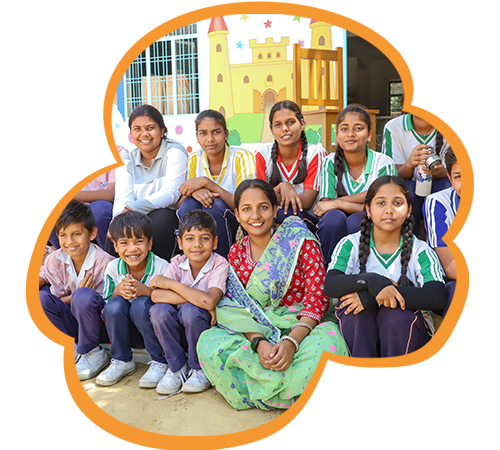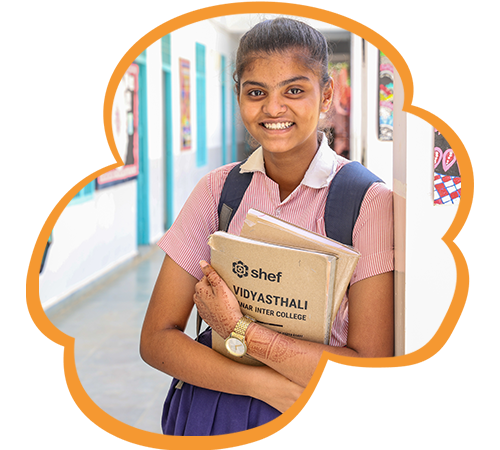
Evolution of Vidyasthali
Vidyasthali grew out of the founder’s engagement with a young woman who she had mentored during her association with an orphanage in the late 80s.
“She wanted to do something for the children, and so, she rounded up 30 children between the ages of 3-8 from neighboring homes. I provided her with simple teaching-learning materials—slates, chalk, books, pencils, erasers, a rolling board, some alphabet and number charts. She worked hard with them for an hour each day and the children made progress. The numbers grew. I helped them build a 2-room structure in her family’s plot right across from her home. A modest honorarium was paid to her and her sister-in-law who took on the role of teachers and administrators. All school supplies were provided by Study Hall School (SHS), and the school ran informally for the next 16 years, growing to a primary school with 150 boys and girls. It was a caring school, though it followed a simple traditional pedagogy. In 2004, SHEF formally adopted this small initiative and using the surplus resources from SH we decided to turn the small informal school into a formal K-12 school. The goal was to have a low-cost, high-quality school in an area where there were none.




“We constructed a building with 9 rooms, called it Vidyasthali, and began in 2005 with 84 children. We kept the fee affordable, charging Rs. 150 per month. We offered the existing students a subsidized fee of Rs. 50 per month. SHS staff trained the teachers continuously, and slowly, our efforts bore fruit.”
The school was thus started in response to the problem of lack of quality education in rural settings. On every educational indicator, rural India scores much lower than its urban counterpart. There is an accompanying starker gender disparity in education, compounded by issues such as child marriage and absence of girls’ agency. In addition, there are differences in educational and self-growth avenues available to different children on the basis of caste.




Overcoming Rural Challenges
Therefore, Vidyasthali has an inclusive approach and a diverse student body in terms of class and caste. The teachers ensure that individual attention is given to each child in a nurturing, caring environment. Academic learning is rooted practically in real-life rural contexts, as students are encouraged to think critically and creatively about the social and physical problems of their regions with the aim of finding effective solutions.
Fighting gender barriers and stereotypes in rural settings on a daily basis, we are just about bridging the gender gap in enrolment by addressing and resolving parents’ concerns about a co-ed environment and thus, encouraging parents to send their daughters to school.
We are also constantly introducing new pedagogies to better meet the challenges of rural education. We have built up a growing value of our brand of education in the region and students are beginning to develop a sense of pride in their own communities, with a corresponding feeling of community activism.
The school continues to grow as we learn more. We believe that ‘quality education’ must enable students to become agents of transformation in their personal lives as well as in their social worlds and we have been working at this for a decade now. We hope our alumni will join us in our endeavor by carrying the work forward and making Vidyasthali a hub of excellence in the region.







